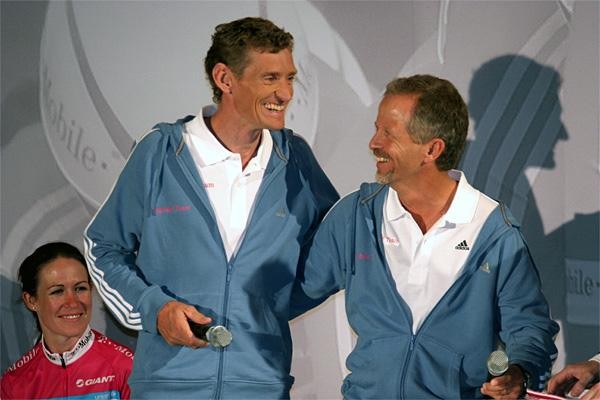T-Mobile responds to 1996 doping charges
By Susan Westemeyer T-Mobile Team is not taking the newest charges of doping in the team's past...

By Susan Westemeyer
T-Mobile Team is not taking the newest charges of doping in the team's past lightly. "Those are serious charges. We will look carefully at the evidence," said Sport Director Rolf Aldag to sid. "We aren't interested in just getting out of this matter. It must all be explained."
Jef D'Hont, a former soigneur for the-then Team Telekom, has claimed that in 1996, when Bjarne Riis won the Tour de France for the team, there was "systematic doping" within the team, administered by the team doctors, who still work for T-Mobile. In a book to be published shortly, he further claims that the former team manager Walter Godefroot organized and financed the doping system.
Aldag, who was a member of the Telekom team at that time, said that it was "unimaginable, that there was systematic doping," and claimed to have a clean conscience and never to have doped. He was supported by team manager Bob Stapleton, who said, "I trust Ralf 100 percent, and also our experiences with the doctors from (the University Clinic) Freiburg have so far been positive."
The two doctors named in the book, Lothar Heinrich and Andreas Schmid, still work for the team and administer the team's highly-vaunted, newly-introduced anti-doping plan. Stapleton admitted that it would be a major blow to the team and the program if the claims were proved to be true. "That would destroy our program. We will take out time and see which information is true."
Heinrich denied the charges through the T-Mobile press office, but did not make a public statement. "The University Clinic Freiburg will be very interested in clearing up this matter," Aldag noted. Stapleton added that if the charges come to nothing, then the doctors could turn to the courts for satisfaction.
Godefroot told Spiegel magazine, which is publishing parts of the book, that he does not want to have his name associated with the book. He specifically denied to the magazine "that I have told someone to use a forbidden substance or that I would organize something like that." The Belgian, who is now a consultant to Team Astana, told rp-online.de "Well, he's writing a book and needs money."
Get The Leadout Newsletter
The latest race content, interviews, features, reviews and expert buying guides, direct to your inbox!
Udo Bölts, now a directeur sportif for Team Gerolsteiner, was also a member of the T-Mobile squad in 1996, and rejected the claims out of hand. In his time as a rider he "never noticed anything like that" he said, adding, "I don't want to comment on this absurdity."
D'Hont claimed that during the Tour in 1996, "in the evenings after the massage there were new EPO units given every two or three days." He specifically claims that Riis and Jan Ullrich, who finished second in the Tour, both received EPO shots, with Ullrich also getting growth hormones.
D'Hont quite his job with Telekom after the 1996 season, saying he "could no longer bear the stress and the doping system," according to "Spiegel". He changed to Française des Jeux. During the Festina doping scandal of 1998, he was charged by an anonymous source, and ultimately sentenced to a nine months suspended sentence. He claimed that during this time, his wife feared a search of the house, and destroyed all his evidence concerning doping and Telekom.
Meanwhile, German anti-doping crusader Werner Franke has joined the fray. He has filed a complaint with prosecutors in Freiburg, charging Heinrich and Schmid with violating drug laws and bodily injury, according to Netzeitung.de. "It is a major scandal, that a German university clinic is being publicly accused of supporting doping-doctors with the continued misuse of medical products - and that for criminal purposes, as well as bodily injury - and all at the expense of the taxpayers," he said.